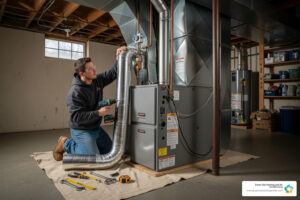Maintaining adequate boiler pressure is essential for households in Mercer Island, especially as the cooler months linger. Boilers depend on a specific range of pressure to operate optimally, ensuring that homes stay warm and comfortable. When the boiler pressure drops, it can disrupt heating systems, leading to an array of unwelcome issues. This can include inefficient heating and even damage to boiler components over time.
Residents of Mercer Island often face unique challenges related to low boiler pressure. The area’s consistent temperature fluctuations can exacerbate pressure problems, making it crucial for homeowners to stay vigilant.
Addressing these issues promptly ensures reliable heating and helps avoid costly repairs. By understanding the common causes and recognizing the signs of low boiler pressure, residents can take proactive steps in maintaining their home environment.
Common Causes of Low Boiler Pressure
Understanding the common causes of low boiler pressure is the first step in addressing the issue effectively. Here are some frequent culprits behind boiler pressure problems:
- Leaks in the System: One of the primary causes of low boiler pressure is leaks in the sealed system. Even minor leaks can lead to a significant drop in pressure over time. Whether it’s a dripping pipe or a joint that needs tightening, identifying leaks early can prevent further damage.
- Bleeding Radiators: Radiators often need bleeding to release the air trapped inside, which usually affects pressure levels. After bleeding your radiators, it’s common to need to top up the boiler pressure.
- Faulty Pressure Relief Valve: Boilers are equipped with pressure relief valves to prevent excessive pressure. If this valve is faulty or obstructed, it could cause pressure fluctuations. Ensuring that the valve is functioning properly can help maintain stable pressure.
- Expansion Vessel Issues: The expansion vessel in a boiler absorbs pressure changes. If it fails, it may cause pressure to drop unexpectedly. A faulty or compromised expansion vessel can lead to pressure loss, impacting the reliability of your heating system.
Identifying these causes allows residents to take timely action. By doing routine checks and addressing these common issues, homeowners in Mercer Island can maintain steady boiler pressure, ensuring their heating systems function efficiently.
How to Identify Low Pressure in Your Boiler
Recognizing the signs of low pressure in your boiler is crucial for maintaining a warm and safe environment in your home. One of the most straightforward methods is by checking the pressure gauge. Typically, the gauge should show a pressure ranging from 1 to 1.5 bars when the system is cold. If the reading is below this range, there might be an issue.
Other symptoms can also indicate low pressure. You might notice that your heating system takes longer to warm up or that the radiators aren’t getting hot. Water temperature inconsistencies, such as fluctuating hot water supply, are common indicators.
If you experience these issues alongside low gauge readings, it’s time to take action. Rather than attempting a do-it-yourself approach, it’s wise to consult our professionals for an assessment, ensuring the problem is correctly identified and resolved.
Steps to Address Low Boiler Pressure
Once low pressure is confirmed, several measures can help restore it:
- Re-pressurizing the System: Most boilers have a filling loop or tap that allows you to increase the pressure. Follow your boiler’s manual for specific instructions, and ensure the boiler is turned off during the process.
- Fixing Leaks: Small leaks at joints or pipes should be addressed immediately. Identify any visible leaks and have our technicians inspect and repair them to prevent further pressure loss.
- Regular Maintenance Tips: Ensuring your boiler receives regular maintenance checks can prevent pressure issues from arising. Keep an eye on the pressure gauge and look for any signs of leaks or unusual noises.
Preventing Future Low-Pressure Issues
Preventing low pressure in your boiler involves regular inspections and maintenance. By being proactive, you can catch potential problems early before they lead to costly repairs.
- Importance of Regular Inspections: Schedule routine inspections from our certified technicians. Our professionals can detect issues that might not be obvious, ensuring the system operates smoothly.
- Tips for Routine Maintenance: Simple tasks such as checking for leaks and keeping the pressure gauge within the recommended range can significantly improve your boiler’s longevity.
- Hiring Our Professionals: Consider hiring our technicians to perform annual checkups. Our professionals have the expertise to identify and rectify issues, providing peace of mind that your boiler is in excellent condition.
Ensuring Your Boiler’s Longevity in Mercer Island
Regular and preventive maintenance plays a vital role in extending the life of your boiler. By being attentive to the pressure and addressing minor issues promptly, you avoid disruptions in your heating system. An efficiently running boiler not only maintains comfort but also keeps energy consumption in check, contributing to long-term cost savings.
Encouraging homeowners in Mercer Island to stay proactive with their boiler care ensures a consistent and reliable home heating environment during cooler periods. Staying informed and vigilant helps prevent frustrations and maintains a cozy and inviting home.
Maintaining proper boiler pressure is crucial for a comfortable home in Mercer Island. If you notice that your boilers in Mercer Island are not performing as expected, taking immediate action can help prevent further issues and maintain steady heat. Our professionals at Green City Heating and Air Conditioning have the expertise to evaluate problems and offer solutions that keep your system running reliably through the colder months. For a quick estimate or to book a service visit, please contact us today.








